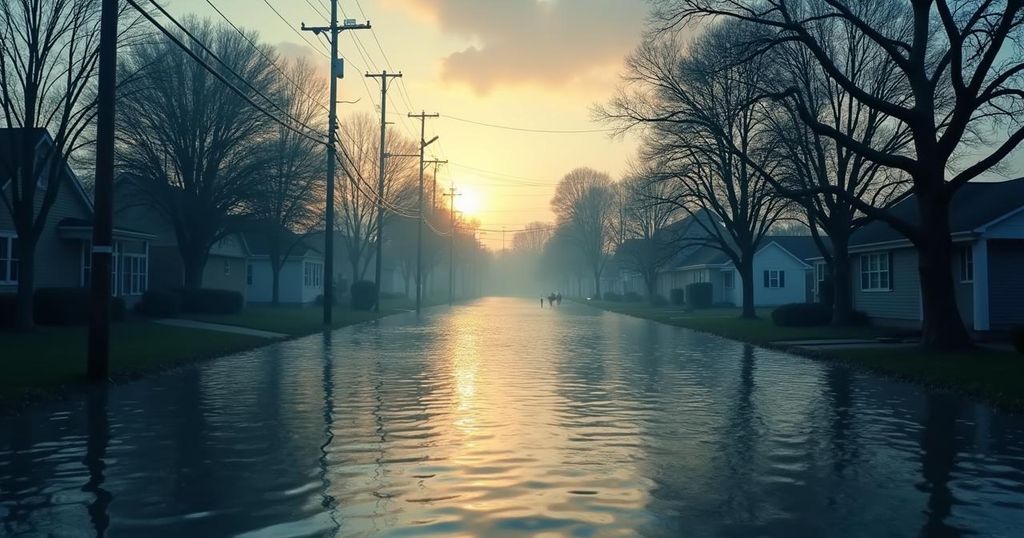Hurricane Helene has caused severe flooding in western North Carolina, leading to loss of life, extensive property damage, and a desperate search for missing persons. Emergency response efforts are overwhelmed as communities come together in the aftermath of this natural disaster, drawing historical parallels to past hurricanes. President Biden has assured support for recovery initiatives in the wake of this calamity.
In Asheville, North Carolina, the impact of Hurricane Helene has left towns reeling from widespread devastation. Beverly and Baxter Eller, residents of Swannanoa for 37 years, found their home submerged for the first time as floodwaters surged through the area. Beverly, aged 68, and her husband, along with their dog, sought refuge in their car after losing their second vehicle to the floods. Operating in survival mode, Beverly stated, “We haven’t cried yet.” The storm, which passed through western North Carolina, caused severe flooding, lifting homes from their foundations and leading to landslides that isolated communities. Emergency responders reported numerous emergencies, and social media became a platform for anxious relatives searching for missing loved ones. Buncombe County manager Avril Pinder described the chaos as reminiscent of “Buncombe County’s own Hurricane Katrina.” The storm’s deadly toll, exacerbated by extensive flooding, has resulted in the loss of 49 lives across five states, including at least seven in North Carolina alone. Taylor Jones, Buncombe County’s emergency management director, indicated that several fatalities were likely unreported due to communication disruptions. Residents were asked to refrain from inundating emergency services with calls regarding missing persons due to overwhelmed systems. Flooding conditions remained dire, with additional rainfall anticipated. Many families awaited news of loved ones under similar conditions to the Ellers, who had yet to contact their son in nearby Weaverville. The couple took shelter in their car near a local shelter, where their wedding rings were preserved in a Ziploc. The Red Cross set up an emergency shelter in the Western North Carolina Agricultural Center, while other residents struggled to cope with extensive power outages affecting over 700,000 in North Carolina alone. As the state braces for further assaults from the storm and its remnants, the situation appears bleak. President Biden expressed commitment to recovery efforts, conveying that no resources would be spared as communities begin to rebuild. Meanwhile, authorities caution residents to remain indoors, urging cooperation to aid emergency services in their response efforts. Reports from other affected states detail record flooding and associated emergencies, creating a widespread humanitarian crisis. As communities brace for recovery, the full extent of Helene’s toll is still unfolding, and the resilience displayed by residents amid tragedy is notable.
Hurricane Helene’s impact has been severe, particularly in North Carolina where communities have faced unprecedented flooding. The storm made landfall as a Category 4 hurricane and transitioned to a post-tropical cyclone as it moved northward, leaving devastation in its wake. The aftermath highlights the challenges of emergency response and the struggles families experience when seeking information about missing loved ones. Historical comparisons to past disasters underscore the gravity of the situation, prompting a coordinated federal response led by agencies such as FEMA. Authorities are working diligently, but the combination of widespread damage, communication failures, and significant casualties complicates recovery efforts significantly.
In summary, Hurricane Helene has wrought havoc across North Carolina and surrounding states, resulting in immense loss of life and widespread flooding. As families suffer the emotional toll of unaccounted loved ones, local and federal agencies execute emergency measures to address the ongoing crisis. The road to recovery will be lengthy, marked by resilience and community support as impacted regions begin to heal from this devastating hurricane.
Original Source: www.washingtonpost.com






